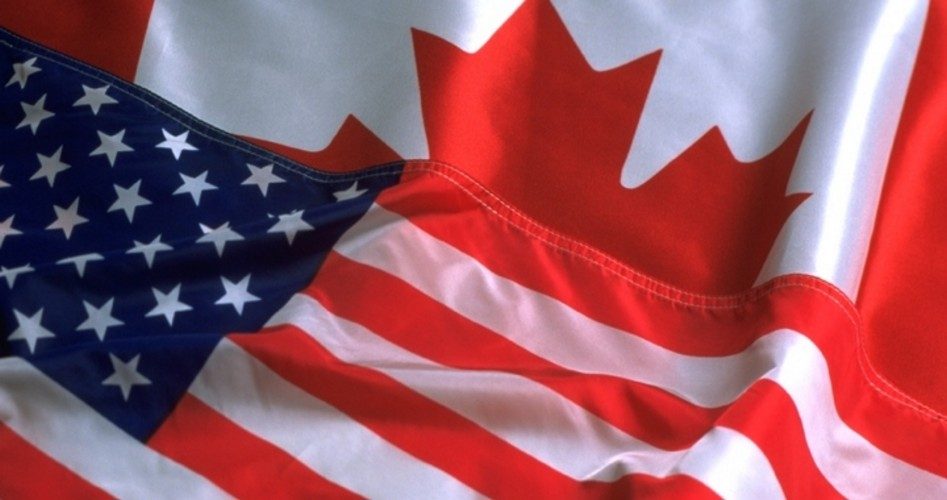
In what can only be a sign that he is softening the beach for an attack on the White House in 2016, Senator Ted Cruz (R-Texas) has “retained counsel” to help him renounce his Canadian citizenship.
Citing a “recent interview” given by Cruz, the Dallas Morning News published an article on December 28 reporting that the freshman senator and lightning rod for leftist rage announced that his lawyers are “preparing the paperwork” necessary to give up the dual citizenship that he maintains as a result of his birth in Calgary, Alberta.
Sorting out Cruz’s legal nationality is legally perplexing for several reasons. First, as indicated, he was born in Canada. His father, though, was a Cuban citizen. Although he would later become a naturalized citizen of the United States (in 2005), when the future senator was born in 1970, the elder Cruz was still a Cuban citizen. As for Cruz’s mother, she was born and raised in Delaware.
Senator Cruz was born while his parents were working in the oil fields of Alberta. They would return to the United States in 1974 after the oil industry took a nose dive.
{modulepos inner_text_ad}
As the race to replace Barack Obama (another man with enduring questions surrounding his legal citizenship) draws nearer, Ted Cruz is understandably concerned with avoiding any connection with a “birther” controversy of his own.
The Dallas Morning News seems to believe that the matter is a non-issue, though, claiming in the article “the strong legal consensus is that with even one American parent — a circumstance shared by Obama and Cruz — a child born anywhere qualifies as a ‘natural born American,’ entitled to citizenship at birth and therefore eligible to serve as president.”
Unfortunately, “strong legal consensus” is not the standard for presidential eligibility. That privilege belongs to Article II of the Constitution.
Article II requires that the president be a “natural born citizen of the United States.”
Although the newspaper reports that Cruz “shrugged off any political implication” of his questionable constitutional qualifications, Americans devoted to upholding constitutional standards and the rule of law are likely a bit less nonchalant.
In order to remain true to the Founders’ intent in drafting Article II, one must delve into the historical origins of the “natural born citizen” phrase as used in the Constitution. The Constitution does not define natural born citizenship, and the Supreme Court and Congress have likewise shied away from putting a finer point on this crucial characteristic.
The term “natural born citizen” comes from the English concept of “natural born subject,” which came from Calvin’s Case, a 1608 decision.
Natural born subjects were those who owed allegiance to the king at birth under the “law of nature.” The court concluded that under natural law, certain people owed duties to the king, and were entitled to his protection, even in the absence of a law passed by Parliament.
Let’s explore the possible sources and appropriate interpretations of the “natural born citizen” qualification, particularly as it applies to Ted Cruz.
At the time of the drafting of the Constitution, a person born subject to the British Crown could hold “double allegiance,” a concept similar to “dual citizenship” as understood today, the very type of situation Ted Cruz is trying to extricate himself from legally with regard to Canada.
Our own Founding Fathers, nearly every one of whom was born in some outpost of the British Empire, feared the damage that could come from such divided loyalty. They instituted the “natural born citizen” qualification in order to avoid what Gouverneur Morris described during the Constitutional Convention as “the danger of admitting strangers into our public councils.”
As famed jurist of the early republic St. George Tucker, a contemporary of Morris, explained:
That provision in the constitution which requires that the president shall be a native-born citizen (unless he were a citizen of the United States when the constitution was adopted) is a happy means of security against foreign influence, which, wherever it is capable of being exerted, is to be dreaded more than the plague. The admission of foreigners into our councils, consequently, cannot be too much guarded against; their total exclusion from a station to which foreign nations have been accustomed to attach ideas of sovereign power, sacredness of character, and hereditary right, is a measure of the most consummate policy and wisdom.
In fact, as indicated in early records of the naturalization process, men applying for American citizenship were required to make two renunciations of all fealty to foreign powers before swearing allegiance to the Republic of the United States.
Furthermore, the possibility of any legal acceptance of divided allegiance was explicitly rejected in a report issued by the House of Representatives in 1874: “The United States have not recognized a ‘double allegiance.’ By our law a citizen is bound to be ‘true and faithful’ alone to our government.”
The practical effect of that proclamation is that in order to be a “natural born citizen” of the United States, one would have to be free from a competing claim for allegiance from another nation.
That such a schizophrenic situation was not only anticipated but accepted by His Majesty’s government during the time of the American founding can be inferred from the impressment of American sailors into the service of the Crown. During the War for Independence, British ships would block American ships from sailing and then the seamen on the British vessels would board the American ships and force the Americans to serve the side of the Empire.
The insistence on the part of the British that anyone born within the realm was a British subject regardless of any voluntary severance thereof and subsequent vow of allegiance to another prince was a significant factor in the hostilities known as the War of 1812.
Finally, in this regard, the British required no process of naturalization as such. Simply being born within the dominions of the monarchy of Great Britain was sufficient to endow one with the rights and privileges granted to any British subject. Nothing such a person did later in life (including becoming a citizen of another country) would ever alter his status as subject.
Obviously, in the United States that concept is neither the law now, nor was it the law at the time of the founding, despite assurances from a cadre of “constitutional scholars,” nearly all of whom reportedly signed off on Cruz’s constitutional qualifications.
Many scholars who have defended Barack Obama’s Article II qualifications argue that the 14th Amendment to the Constitution provides that although born outside the United States to a foreign father, Cruz (and President Obama, they insist) fits the 14th Amendment’s definition of a natural born citizen.
The relevant clause of the 14th Amendment reads: “All persons born or naturalized in the United States, and subject to the jurisdiction thereof, are citizens of the United States and the States wherein they reside.”
The principal architect of the citizenship clause of the 14th Amendment was Michigan Senator Jacob Merritt Howard, a Republican representing Detroit.
Senator Howard crafted much of the language that was eventually ratified as part of the 14th Amendment.
During the debates that embroiled the Senate in the years following the Civil War, Senator Howard insisted that the qualifying phrase “subject to the jurisdiction thereof” be inserted into Section 1 of the 14th Amendment being considered by his colleagues. In the speech with which he proposed the alteration, Howard declared:
This amendment which I have offered is simply declaratory of what I regard as the law of the land already, that every person born within the limits of the United States, and subject to their jurisdiction, is by virtue of natural law and national law a citizen of the United States. This will not, of course, include persons born in the United States who are foreigners, aliens, [or] who belong to the families of ambassadors or foreign ministers accredited to the Government of the United States, but will include every other class of persons.
How could a person “born in the United States” be simultaneously a citizen and a “foreigner” or “alien” if the mere fact of nativity settled the question of citizenship?
Another legislator commenting at the time of the ratification of the 14th Amendment, Representative John Bingham, provided the following clarification of the meaning behind the “subject to the jurisdiction thereof” clause: “Every human being born within the United States of parents not owing allegiance to any foreign sovereignty is, in the language of your Constitution itself, a natural born citizen.”
While similar questions have been raised regarding the Article II eligibility of Senator John McCain (R-Ariz.) who ran for president in 2000 and in 2008, and Mitt Romney, who ran in 2008 and 2012, the case of those two men is distinct from that of Cruz.
Both McCain, who was born in the Panama Canal Zone to an American father serving overseas in the military, and Romney, whose father was born in Mexico to American parents, pass constitutional muster.
However, although not necessarily in the way some legal analysts insist, when applied to the case of Senator Ted Cruz, the principles of constitutional law and interpretation set forth above call into question his qualification for president.
So, although Senator Cruz is wise to renounce his Canadian citizenship, it may prove to be insufficient to overcome a more substantial bar to his election as president of the United States.
There is no debate that at the time of his birth (regardless of the location), Cruz’s father was not an American citizen — making the senator the child of a person who at the time of his (the child’s birth) retained legal allegiance to a foreign sovereign, thus disqualifying Cruz from the presidency.
That is unless Senator Cruz’s recently retained attorneys are able to explain away these lingering issues. If they cannot, constitutionalists are likely to come to the perhaps painful decision that the popular freshman firebrand and friend of the Constitution does not conform to the accepted legal definition of “natural born citizen.”
Joe A. Wolverton, II, J.D. is a correspondent for The New American and travels frequently nationwide speaking on topics of nullification, the NDAA, and the surveillance state. He is the host of The New American Review radio show that is simulcast on YouTube every Monday. Follow him on Twitter @TNAJoeWolverton and he can be reached at [email protected]



